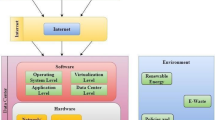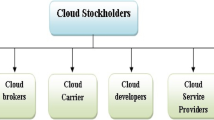Abstract
Cloud computing brings convenience to users worldwide in the era of green computing. However, massive data computation requires equally large amounts of energy, thereby introducing challenges to workflow scheduling in the cloud under budget constraints. On the basis of whale optimization algorithm, this study proposes a new metaheuristic workflow scheduling algorithm called energy minimization whale optimization algorithm (EM_WOA), which reduces energy consumption in the cloud. EM_WOA applies two strategies, namely, service instance selection and energy consumption reduction. In the first phase, candidate virtual machines are selected based on the budget constraints given by the user. In the second phase, the optimal scheduling solution is identified by changing the position of the whale. Extensive experiments are performed in real workflow applications, and results show that EM_WOA is more efficient and competitive than state-of-the-art meta-heuristic algorithms.






Similar content being viewed by others
References
Hu Y, Zheng J, Zou J, Yang S, Ou J, Wang R (2020) A dynamic multi-objective evolutionary algorithm based on intensity of environmental change. Inf Sci 523:49–62
Juve G, Chervenak A, Deelman E, Bharathi S, Mehta G, Vahi K (2013) Characterizing and profiling scientific workflows. Futur Gener Comput Syst 29(3):682–692
Shi W, Cao J, Zhang Q, Li Y, Xu L (2016) Edge computing: Vision and challenges. IEEE Internet Things J 3(5):637–646
Wu CQ, Lin X, Yu D, Xu W, Li L (2014) End-to-end delay minimization for scientific workflows in clouds under budget constraint. IEEE Trans Cloud Comput 3(2):169–181
Al-Maytami BA, Fan P, Hussain A, Baker T, Liatsis P (2019) A task scheduling algorithm with improved makespan based on prediction of tasks computation time algorithm for cloud computing. IEEE Access 7:160916–160926
Arabnejad V, Bubendorfer K, Ng B (2019) Budget and deadline aware e-science workflow scheduling in clouds. IEEE Trans Parallel Distrib Syst 30(1):29–44
Zhang L, Li K, Xu Y, Mei J, Zhang F, Li K (2015) Maximizing reliability with energy conservation for parallel task scheduling in a heterogeneous cluster. Inf Sci 319:113–131
Xiao X, Xie G, Li R, Li K (2016) Minimizing schedule length of energy consumption constrained parallel applications on heterogeneous distributed systems. In 2016 IEEE Trustcom/BigDataSE/ISPA, pp. 1471–1476
Quan Z, Wang Z-J, Ye T, Guo S (2020) Task scheduling for energy consumption constrained parallel applications on heterogeneous computing systems. IEEE Trans Parallel Distrib Syst 31(5):1165–1182
Zhang L, Wang L, Wen Z, Xiao M, Man J (2020) Minimizing energy consumption scheduling algorithm of workflows with cost budget constraint on heterogeneous cloud computing systems. IEEE Access 8:205099–205110
Yu H, Wang Q, Guo S (2018) Energy-efficient task offloading and resource scheduling for mobile edge computing. In 2018 IEEE international conference on networking, architecture and storage (NAS), pp. 1–4
Chen Z-G, Zhan Z-H, Lin Y, Gong Y-J, Gu T-L, Zhao F, Yuan H-Q, Chen X, Li Q, Zhang J (2019) Multiobjective cloud workflow scheduling: A multiple populations ant colony system approach. IEEE Trans Cybern 49(8):2912–2926
Beegom AA, Rajasree M (2019) Integer-pso: a discrete pso algorithm for task scheduling in cloud computing systems. Evol Intell 12(2):227–239
Gomathi B, Krishnasamy K, Balaji BS (2018) Epsilon-fuzzy dominance sort-based composite discrete artificial bee colony optimisation for multi-objective cloud task scheduling problem. Int J Bus Intell Data Mining 13(1–3):247–266
Xue J, Li L, Zhao S, Jiao L (2014) A study of task scheduling based on differential evolution algorithm in cloud computing. In 2014 International Conference on Computational Intelligence and Communication Networks, pp. 637–640
Elsherbiny S, Eldaydamony E, Alrahmawy M, Reyad AE (2018) An extended intelligent water drops algorithm for workflow scheduling in cloud computing environment. Egypt Inform J 19(1):33–55
Zhu Z, Zhang G, Li M, Liu X (2016) Evolutionary multi-objective workflow scheduling in cloud. IEEE Trans Parallel Distrib Syst 27(5):1344–1357
Zhang L, Li K, Li C, Li K (2017) Bi-objective workflow scheduling of the energy consumption and reliability in heterogeneous computing systems. Inf Sci 379:241–256
Zhou Z, Li F, Zhu H, Xie H, Abawajy JH, Chowdhury MU (2020) An improved genetic algorithm using greedy strategy toward task scheduling optimization in cloud environments. Neural Comput Applic 32(6):1531–1541
Bao L, Wu C, Bu X, Ren N, Shen M (2019) Performance modeling and workflow scheduling of microservice-based applications in clouds. IEEE Trans Parallel Distrib Syst 30(9):2114–2129
Ma H, Zhang M (2016) An improved genetic-based approach to task scheduling in inter-cloud environment. Int J Comput Sci Softw Eng 5(3):28
Peng H, Wen W-S, Tseng M-L, Li L-L (2019) Joint optimization method for task scheduling time and energy consumption in mobile cloud computing environment. Appl Soft Comput 80:534–545
Chen X, Cheng L, Liu C, Liu Q, Liu J, Mao Y, Murphy J (2020) A woa-based optimization approach for task scheduling in cloud computing systems. IEEE Syst J 14(3):3117–3128
Panwar N, Negi S, Rauthan MMS, Vaisla KS (2019) Topsis-pso inspired non-preemptive tasks scheduling algorithm in cloud environment. Clust Comput 22(4):1379–1396
Wu Q, Ishikawa F, Zhu Q, Xia Y, Wen J (2017) Deadline-constrained cost optimization approaches for workflow scheduling in clouds. IEEE Trans Parallel Distrib Syst 28(12):3401–3412
Ismayilov G, Topcuoglu HR (2020) Neural network based multi-objective evolutionary algorithm for dynamic workflow scheduling in cloud computing. Futur Gener Comput Syst 102:307–322
Huang W, Wang Z, Dong M, Qian Z (2016) A two-tier energy-aware resource management for virtualized cloud computing system. Sci Program
Li Z, Ge J, Hu H, Song W, Hu H, Luo B (2018) Cost and energy aware scheduling algorithm for scientific workflows with deadline constraint in clouds. IEEE Trans Serv Comput 11(4):713–726
Lin X, Wang Y, Xie Q, Pedram M (2015) Task scheduling with dynamic voltage and frequency scaling for energy minimization in the mobile cloud computing environment. IEEE Trans Serv Comput 8(2):175–186
Tang Z, Qi L, Cheng Z, Li K, Khan SU, Li K (2016) An energy-efficient task scheduling algorithm in dvfs-enabled cloud environment. J Grid Comput 14(1):55–74
Lee YC, Zomaya AY (2011) Energy conscious scheduling for distributed computing systems under different operating conditions. IEEE Trans Parallel Distrib Syst 22(8):1374–1381
Xie G, Jiang J, Liu Y, Li R, Li K (2017) Minimizing energy consumption of real-time parallel applications using downward and upward approaches on heterogeneous systems. IEEE Trans Ind Inf 13(3):1068–1078
Zhang L, Li K, Zheng W, Li K (2017) Contention-aware reliability efficient scheduling on heterogeneous computing systems. IEEE Trans Sustain Comput 3(3):182–194
Zhang L, Zhou L, Salah A (2020) Efficient scientific workflow scheduling for deadline-constrained parallel tasks in cloud computing environments. Inf Sci 531:31–46
Zhu D, Melhem R, Mossé D (2004) The effects of energy management on reliability in real-time embedded systems. In IEEE/ACM International Conference on Computer Aided Design. ICCAD-2004, pp. 35–40
Mirjalili S, Lewis A (2016) The whale optimization algorithm. Adv Eng Softw 95:51–67
Acknowledgements
The authors would like to thank three anonymous reviewers for their suggestions to improve the manuscript. This work was partially funded by the National Key R&D Program of China (Grant No. 2018YFB1003401), the National Natural Science Foundation of China (Grant Nos. 61702178, 61871432, 62072172), the Natural Science Foundation of Hunan Province (Grant Nos. 2019JJ50123, 2019JJ60054), the Research Foundation of Education Bureau of Hunan Province (Grant Nos. 20C0625, 18C0528), and in part by China Scholarship Council (Grant No. 201808430297).
Author information
Authors and Affiliations
Corresponding authors
Additional information
Publisher’s Note
Springer Nature remains neutral with regard to jurisdictional claims in published maps and institutional affiliations.
This article is part of the Topical Collection: Special Issue on Green Edge Computing.
Guest Editors: Zhiyong Yu, Liming Chen, Sumi Helal, and Zhiwen Yu
Rights and permissions
About this article
Cite this article
Zhang, L., Wang, L., Xiao, M. et al. EM_WOA: A budget-constrained energy consumption optimization approach for workflow scheduling in clouds. Peer-to-Peer Netw. Appl. 15, 973–987 (2022). https://doi.org/10.1007/s12083-021-01267-3
Received:
Accepted:
Published:
Issue Date:
DOI: https://doi.org/10.1007/s12083-021-01267-3




